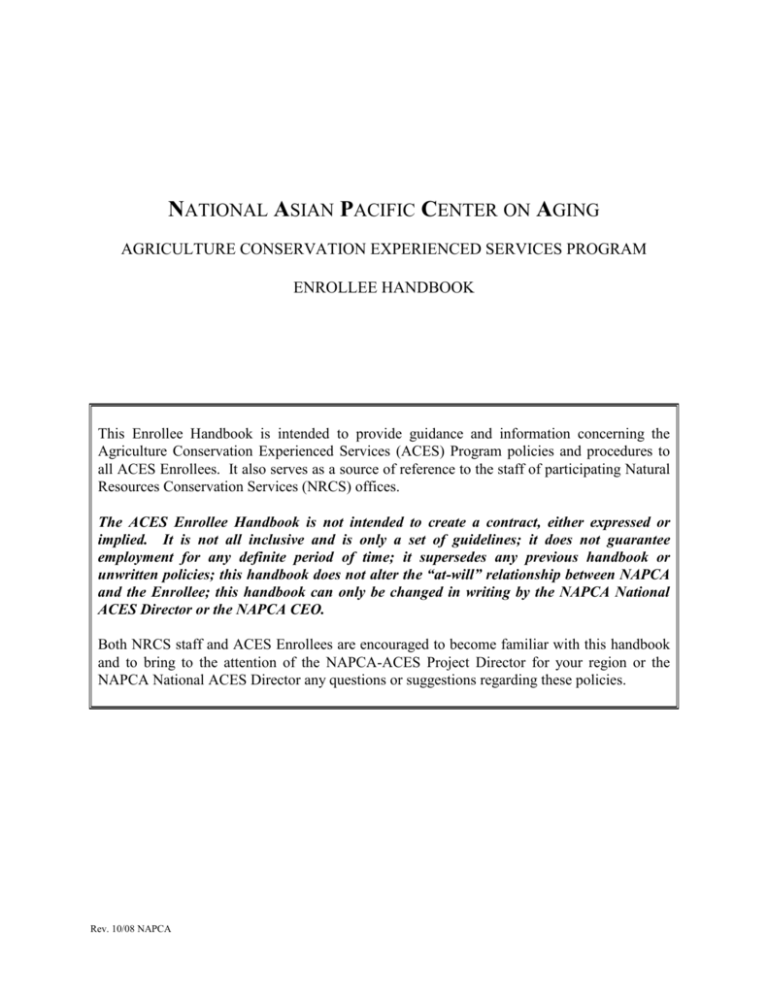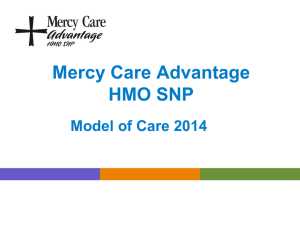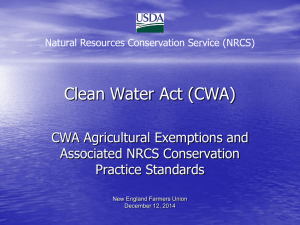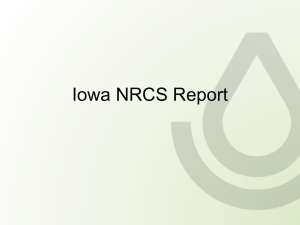ENROLLEE HANDBOOK-EPA
advertisement

NATIONAL ASIAN PACIFIC CENTER ON AGING AGRICULTURE CONSERVATION EXPERIENCED SERVICES PROGRAM ENROLLEE HANDBOOK This Enrollee Handbook is intended to provide guidance and information concerning the Agriculture Conservation Experienced Services (ACES) Program policies and procedures to all ACES Enrollees. It also serves as a source of reference to the staff of participating Natural Resources Conservation Services (NRCS) offices. The ACES Enrollee Handbook is not intended to create a contract, either expressed or implied. It is not all inclusive and is only a set of guidelines; it does not guarantee employment for any definite period of time; it supersedes any previous handbook or unwritten policies; this handbook does not alter the “at-will” relationship between NAPCA and the Enrollee; this handbook can only be changed in writing by the NAPCA National ACES Director or the NAPCA CEO. Both NRCS staff and ACES Enrollees are encouraged to become familiar with this handbook and to bring to the attention of the NAPCA-ACES Project Director for your region or the NAPCA National ACES Director any questions or suggestions regarding these policies. Rev. 10/08 NAPCA PREFACE The Agriculture Conservations Services (ACES) program was established in 2008 by the Food, Conservation and Energy Act of 2008 (PL 110-234). The ACES program draws upon the vast pool of talent, experience, and skills possessed by individuals 55 years and older. The purposes of the ACES program are: To give workers age 55 and over an opportunity to use their skills in creative and meaningful assignments. To recognize the tremendous wealth of productive, talented older workers among public and private employers. To supplement NRCS staff who are on the federal payroll with technical services in support of conservation-related programs. The NRCS awards agreements for the ACES program to national aging organizations through a grant process. The grantee recruits, secures the services of, and pays salaries to the older workers under the ACES program. ACES workers are not federal employees, nor are they employees of the grantee organizations, rather they are "Enrollees" in the ACES Program. The grantee organization works with the requesting NRCS office to develop appropriate assignments for placement in a designated NRCS office. The grantee is responsible for recruiting and screening candidates. On-site, an NRCS employee (called a Monitor) directs the ACES Enrollee in daily activities. Monitoring of ACES Enrollees by the grantee organization occurs on a regular basis. The work being performed by ACES Enrollees provides vital support to the overall goal of the NRCS pertaining to conservation related programs. Currently, ACES Enrollees work in various NRCS offices around the country. ACES Enrollees work in part-time or full-time assignments, depending on their interests and the particular needs of the requesting NRCS office. Assignments are technical in nature. The only requirements for participation in the program is that the applicant be at least 55 years old and legally entitled to work in the United States. Rev. 1/09 NAPCA i TABLE OF CONTENTS PREFACE ................... ............................................................................................................ i TABLE OF CONTENTS ............................................................................................................... ii 100 GENERAL RESPONSIBILITIES .......................................................................................1 101 Enrollee Responsibilities ........................................................................................1 200 ENROLLMENT...................................................................................................................1 201 Eligibility .................................................................................................................1 202 Employment at Will .................................................................................................2 203 Equal Employment Opportunity/Affirmative Action ..............................................2 204 Sexual & Other Forms of Harassment .....................................................................2 205 Citizenship ...............................................................................................................2 206 Disabilities ...............................................................................................................2 300 ENROLLEE BENEFITS AND LEAVE POLICIES............................................................3 301 Paid Holidays ...........................................................................................................4 302 Vacation Leave ........................................................................................................4 303 Sick Leave ................................................................................................................4 304 Absence Due to Work Injury or Illness ....................................................................5 305 Jury Duty Leave .......................................................................................................5 306 Family & Medical Leave (FMLA) ...........................................................................6 307 Leave of Absence-----Leave Without Pay................................................................6 400 WORK HOURS, TRAINING, AND ABSENTEEISM.......................................................8 401 Authorized Work Hours ...........................................................................................8 402 Overtime Hours & Overtime Pay. ............................................................................8 403 Compressed Assignments & Schedules ...................................................................8 404 Training…………………………………………………………..………………………............. 8 405 Absence From Work……….................................................. …….……………………………9 500 RENEWALS.. ......................................................................................................................9 501 Purpose of Renewals & Pay Increases .....................................................................9 Rev. 1/09 NAPCA ii 600 GUIDELINES FOR CORRECTIVE ACTIONS ...............................................................10 601 Policy..... ................................................................................................................10 602 Termination ............................................................................................................10 A. Good Reason ..............................................................................................11 B. Reduction in Force .....................................................................................11 603 Grievance/Appeal Procedures ................................................................................11 700 ENROLLEE HEALTH AND SAFETY ............................................................................11 701 Policy .....................................................................................................................11 702 Responsibilities of Enrollees..................................................................................11 703 Responsibilities of NRCS Monitor ........................................................................12 704 Reporting Work Related Injuries and Illnesses ......................................................12 800 RULES OF CONDUCT.....................................................................................................13 801 Policy..... ................................................................................................................13 802 Workplace Violence Policy……………………………………… .......................13 803 Lobbying Activities ................................................................................................13 900 TIME AND ATTENDANCE REPORTING .....................................................................13 901 Time and Attendance Report .................................................................................13 902 Procedure ...............................................................................................................14 903 Explanation of Codes .............................................................................................14 904 Check Availability .................................................................................................14 905 Reimbursement RequestHealth Care, Travel .....................................................14 1000 TRAVEL ............................................................................................................................15 1001 General..... ..............................................................................................................15 1002 Local Travel ...........................................................................................................15 1003 Out-of-town Travel ................................................................................................16 A. Prior Approval ...........................................................................................16 B. Advances ....................................................................................................17 C. Travel Expense Reports .............................................................................17 D. Calculating Assignment Hours ..................................................................18 E. Weekend Travel .........................................................................................18 F. Rental Cars .................................................................................................18 G. Day Trip .....................................................................................................18 1100 ENROLLEE EXPENSES ..................................................................................................19 1101 Non-Travel Expenses .............................................................................................19 1102 Telephone Calls .....................................................................................................19 FORMS ALL NAPCA FORMS ARE AVAILABLE FROM YOUR NAPCA-ACES PROJECT DIRECTOR Rev. 1/09 NAPCA iii 100 GENERAL RESPONSIBILITIES 101 Enrollee Responsibilities NAPCA-ACES Program Enrollees are participants in the Agriculture Conservation Experienced Services Program. They are not federal employees. Their worksites are in federal or state agencies. Enrollees will perform their assignments in a safe and responsible manner at all times. Attire shall be appropriate for the assignment. Enrollees will take responsibility for prompt and accurate submission of Time and Attendance Reports. Any falsification of information on these timesheets may result in disciplinary action, including removal, and may result in a fine of not more than $10,000 or imprisonment of not more than 5 years or both (18 U.S.C. 1001). The same applies to any required written activity reports. Requests for reimbursement for travel or supplies must be made with proper documentation and authorization within thirty days of expenditure. Due to the nature of the assignment (which is based upon an approved Assignment Description), Enrollees may be requested to: A. B. C. D. E. Hold a valid driver's license. Travel frequently. Be away from home one or more nights. Participate in air travel. Have medical monitoring. Assignment-related issues or difficulties shall be discussed with the NRCS Monitor and/or the appropriate NAPCA-ACES Project Director. 200 ENROLLMENT 201 Eligibility Applicants selected for enrollment must have attained 55 years of age at date of hire. Candidates must have appropriate work experience and/or education to meet the assignment requirements. 202 Employment at Will NAPCA is an “at-will” company and operates under the provision that Enrollees have the right to resign their position at any time, with or without notice and with or without cause. NAPCA has Rev. 1/09 NAPCA 1 similar rights to terminate the enrollment relationship with or without notice and with or without cause. 203 Equal Employment Opportunity/Affirmative Action It is the policy of the NAPCA-ACES Program to promote equal opportunity and nondiscriminatory practices in all facets of its operations. NAPCA-ACES Program practices shall insure all persons equal opportunity to work and advance within the ACES Program on the basis of merit, fitness, and ability, regardless of race, religious faith, political affiliation, sexual orientation, ethnic background, nationality, past military status, or any other classification protected by law. Participants in this program must be 55 years of age or older as required by Public Law (PL) 110-234. 204 Sexual & Other Forms of Harassment Sexual and other forms of office place harassment based upon age, race, religious faith, political affiliation, sexual orientation, ethnic background, nationality, past military status, or any other classification protected by the law will not be tolerated by the NAPCA-ACES Program. All complaints made will be investigated promptly, fairly, and thoroughly. The NAPCA-ACES Program is responsible for investigating claims made by Enrollees as well as claims made against Enrollees. Harassment is a form of discrimination and is an unlawful office-place practice as interpreted by the courts from Title VII of the Civil Rights Act. 205 Citizenship The Immigration Reform and Control Act of 1986 subjects employers to penalties if they knowingly hire illegal aliens or if they discriminate against employees or prospective employees because of their "citizenship status." The NAPCA-ACES Program requires all Enrollees to complete Immigration Form I-9 and provide documents to establish both identity and employment authorization. 206 Disabilities It is the stated policy of the NAPCA-ACES Program that any disabled person who can perform the essential functions of the assignment in question with reasonable accommodation(s) shall be considered. NAPCA will comply with all requirements of the federal Americans with Disabilities Act (ADA). 300 ENROLLEE BENEFITS AND LEAVE POLICIES Rev. 1/09 NAPCA 2 301 Paid Holidays There are ten paid holidays per calendar year, which is consistent with the federal holiday schedule. The authorized holidays are as follows: New Year's Day President's Day Independence Day Columbus Day Thanksgiving Day Martin Luther King, Jr. Day Memorial Day Labor Day Veterans Day Christmas Day Holidays are pro-rated for Enrollees with assignment hours less than 80 hours per pay period. Divide biweekly authorized hours by 10 and round up if .50 or over, and down if under .50 to the next hour. ACES chart for approximate hours: Authorized Hours Per Pay Period 80 70 64 60 48 40 36 32 16 Holiday Hours 8.0 7.0 6.5 6.0 5.0 4.0 4.0 3.0 2.0 If the approved schedule is ten hours per day, four days per week, code the “other hours” column with eight hours holiday and two hours vacation leave on the Time and Attendance Report to be paid for ten hours. (NAPCA pays a maximum of 8 hours for a holiday.) Enrollees may not work or initiate travel on designated holidays, and Enrollees must be in active status before or after a holiday to be paid for the holiday. Enrollees on a part-time schedule may, with their Monitor’s approval, rotate their work days during the same week to be paid for their holidays. If confusion arises regarding proper accounting of paid holidays, contact your NAPCA-ACES Project Director before submitting your time sheet. Time and Attendance Reports will be marked “H” for holiday leave. Rev. 1/09 NAPCA 3 302 Vacation Leave All Enrollees are entitled to vacation leave which accumulates at the rate of approximately 4.6 hours per pay period for Enrollees who work 40 hours per week. For part-time Enrollees, the rate is proportionate to hours worked. Enrollees may carry up to 80 hours of vacation beyond December 31 of each year. Any vacation accrued in excess of 80 hours and not taken by midnight on December 31st will be lost to the Enrollee. (ACES Project Director must be contacted regarding any exceptions to this policy.) Leave must be accumulated prior to the pay period being used. Vacation time may be taken after four weeks of enrollment, with the approval of the NRCS Monitor and NAPCA-ACES Project Director. Normally, an NRCS Monitor and NAPCA-ACES Project Director shall be given at least two weeks notice of planned vacations by the Enrollee submitting an Enrollee Leave Request Form. Enrollees must use or be reimbursed for earned vacation upon their termination or grant/contract termination, since benefits earned during a funding period may not be paid outside of that funding period. Time and Attendance Reports must be marked “VL” for vacation leave. 303 Sick Leave Sick leave is accumulated at the rate of approximately 3.69 hours per pay period for enrollees who work a 40-hour week. For part-time Enrollees, the rate is proportionate to hours worked. Enrollees are entitled to sick leave with pay after four weeks of enrollment. Sick leave with pay is allowed in case of injury, illness, or medical, dental, optical or professional appointments of a similar nature. Sick leave also covers absences due to sickness, or medical or dental appointments of an Enrollee's dependent, when the Enrollee's attendance is required or recommended by a health care professional. To receive sick leave pay, Enrollees must satisfy the following requirements: A. Absence due to illness or injury must be reported within two hours of normal starting time to your monitor. B. Call each day of absence. When absent for three or more consecutive days without calling in, termination procedures may be initiated. C. A doctor's statement to permit an Enrollee's Work Resumption after illness and injury shall be required after an absence of five business days. This statement is to be provided to the NRCS Monitor and the NAPCA-ACES Project Director before the Enrollee may return to work, and be included with the leave slip when the next time record is due. D. Refer to Section 308 for information on Family Medial Leave Act (FMLA). Rev. 1/09 NAPCA 4 Claims for sick leave are limited to the actual amount of time lost due to illness or disability rounded to the nearest half-hour and cannot exceed sick leave accumulation. Accumulated sick leave will not be paid to Enrollees at the end of their enrollment and cannot be used for vacation. Enrollees may carry over up to sixty-five (65) days of sick leave beyond December 31 of each year. For part-time Enrollees, the carry-over rate is proportionate to the percentage of full-time hours worked. Any sick leave accrued in excess of 65 days, or their part-time equivalent, will be lost to the Enrollee at midnight on December 31. 304 Absence Due to Assignment-Related Injury or Illness Enrollees, for whom an Enrollee's Report of Injury has been filed and who are unable to perform their duties because of the work-related injury or illness, may become eligible to receive income benefits under Worker's Compensation. In every state, there is a statutory "Waiting Period" before income benefits are payable under Worker's Compensation. Specific information is available at your state’s Department of Labor and Industry. In all states, the waiting period begins the day after the date of injury or illness. During the "Waiting Period", Enrollees should be granted sick leave (Section 704). Beginning the day after the waiting period expires, the Enrollee becomes eligible to receive income benefits under Worker's Compensation, if they are still unable to perform their duties. No further sick leave shall be granted during the time the Enrollee is receiving Worker's Compensation. During the time period the Enrollee is on Worker's Compensation, the Enrollee will be considered on inactive status by NAPCA. The Enrollee is responsible for notifying the NAPCA-ACES Project Director immediately anytime an accident occurs on the job. The Enrollee is also responsible for seeing that all the necessary forms for the state pertaining to Worker’s Compensation Claims are properly filled out and submitted. (Your physician has these forms in their office.) 305 Jury Duty Leave A. If the Enrollee requires leave for jury duty, the Enrollee must immediately provide written notice of having been called for jury duty to both the NAPCA-ACES Project Director and NRCS Monitor. B. The Enrollee shall request the court not to pay them for the number of jury hours normally scheduled for that day if payment for those hours will be made by the NAPCAACES Program. If the Enrollee receives payment from the court, the moneys should be given to the NAPCA-ACES program for payment for the full day. The Enrollee, however, is entitled to any reimbursement from the court for out-of-pocket expenses such as travel. Rev. 1/09 NAPCA 5 C. If an Enrollee is excused as a juror or a witness by the court on any day falling within a normal assignment schedule, the Enrollee must notify the NRCS Monitor and, if directed, report for the balance of the normal assignment schedule. The Enrollee shall enter a "J" along with the actual hours normally worked for those days on the Time and Attendance Report and shall also submit written evidence of having served during the "J" time shown. 306 Family and Medical Leave of Absence (FMLA) The federal Family and Medical Leave Act (FMLA) became effective on August 5, 1993. The FMLA provides up to a maximum 12 weeks off in any 12-month period of time to care for a family member or for an individual’s medical leave purposes. The 12 weeks includes any accrued sick and vacation time. NAPCA’s Family and Medical Leave Policy (FMLP) will follow the Federal FMLA policy. If an Enrollee is working in a state that has a more liberal Family and Medical Leave Act, NAPCA will follow those rules. Under the Federal FMLA: A. You must have been enrolled in the NAPCA ACES Program for a minimum of one year and have worked at least 1250 hours during the 12-month period immediately preceding the request for leave. B. NAPCA will require the use of all available leave first, both sick and vacation. C. If you are covered under the NAPCA-ACES Program Enrollee Medical Insurance, your coverage will continue to be paid by the NAPCA-ACES Program for the 12-week period. D. If you are paying for Dental Coverage, you must arrange for payment while you are on FMLA with your NAPCA-ACES Project Director. E. An Enrollee wishing to use the FMLA should submit the request to their Monitor and the NAPCA-ACES Project Director. It must include the reasons for taking the planned leave. NAPCA has the necessary forms available for the Enrollee to submit. 307 Leave of Absence - Leave Without Pay This type of leave is designated for absence from work not covered by other authorized leave policy as stated in this section. This leave is designed for humanitarian purposes (i.e., emergency support to family members or relatives) and is to be considered on a case-by-case basis. Request for such leave must be submitted in writing by the Enrollee to his/her immediate NRCS Monitor stating: A. The reason for the leave; B. The expected duration of the leave; and C. The estimated date of return to pay status. The NRCS Monitor shall forward a copy of the request for leave with a recommendation for approval or denial to the appropriate NAPCA-ACES Project Director for action. Approval or denial of Leave Without Pay (LWP) resides with NAPCA. Time and Attendance Reports will be marked (“LWP”) for Leave Without Pay Rev. 1/09 NAPCA 6 400 WORK HOURS, TRAINING, AND ABSENTEEISM 401 Authorized Work Hours The work schedule for each Enrollee shall be agreed upon between the NRCS Monitor and the Enrollee and approved by the NAPCA-ACES Project Director. An Enrollee may not volunteer to work extra hours at his/her regularly scheduled assignment without prior approval from the NAPCA-ACES Project Director. 402 Overtime Hours and Overtime Pay Enrollees are requested not to work over 40 hours in a one-week period. If there is an exception to this and overtime is required and approved by NRCS, NAPCA is responsible for monitoring and controlling ACES Enrollee overtime within the NRCS offices. In accordance with the provisions of the Fair Labor Standards Act, NAPCA provides pay at a rate of time-and-a-half for tasks performed in excess of 40 hours per week. It is understood that any assignment hours in excess of 40 Hours per week must be approved in writing and authorized by the appropriate NRCS officials, i.e. the Monitor and NRCS ACES Coordinator and the NAPCA-ACES Project Director. 403 Compressed Assignment Schedule The NAPCA-ACES Program, in cooperation with the various NRCS Divisions and Offices, has agreed to allow ACES Enrollees to be assigned pre-approved compressed schedules which can consist of no more than 40 hours per week and must be approved by the NRCS Monitor and the NAPCA-ACES Project Director. 404 Training All training requires prior approval by the NAPCA-ACES Project Director. Training costs are charged to the agreement that covers the Enrollee. Any training and associated travel requires prior approval of the Enrollee’s NRCS Monitor. Written confirmation of this approval must be submitted by the NRCS Monitor to the NAPCAACES Project Director. An original Training Request Form is to be completed by the Enrollee and submitted 30 days in advance of training, except in special cases, such as when the training or conference becomes available unexpectedly. Attach all documentation of training, registration forms, brochures, etc. Faxed copies will begin the process but originals must be submitted for final payment. Rev. 1/09 NAPCA 7 If out of town travel is required, the Travel Request Form should be submitted with the Training Request. These will be returned to the Enrollee upon approval by NAPCA. The forms should then be attached to the Travel Expense Report to NAPCA upon completion of training and travel. 405 Absence from Work Absence from work due to illness, emergency, and/or other reasons must be reported to the NRCS Monitor no later than two hours following scheduled starting time. An Enrollee shall call on each day of absence, unless other arrangements have been made with the NRCS Monitor. Failure to report an absence within the stated time may be considered justification for disallowing hours on the Time and Attendance Report for that day. Failure to provide notification may be reason for dismissal. Assignment abandonment may be considered as a cause for termination of enrollment if an Enrollee arbitrarily leaves the assignment for three working days without explanation or contacting the NRCS Monitor or the NAPCA-ACES Project Director. If an Enrollee misses three consecutive workdays for any reason including but not limited to illness or accident, the NRCS Monitor must notify the NAPCA-ACES Project Director. Absence from the assignment after five workdays due to medical reasons will require a doctor's statement to permit an Enrollee's work resumption after illness and injury. This statement must be furnished to the NAPCA-ACES Project Director, who will notify the NRCS Monitor before the Enrollee may resume work. A Leave Request Form must be filled out for five or more missed workdays. 500 RENEWALS 501 Enrollee Renewals Enrollee performance criteria are addressed at the end of each Task Agreement by the Monitor, the Enrollee, and the NAPCA-ACES Project Director. Renewals are authorized by the NRCS Monitor. The Program allows a fifty-cent per hour increase on the yearly anniversary of the enrollees acceptance into the program. This policy was established by the NRCS-ACES program office and is adhered to by NAPCA. Rev. 1/09 NAPCA 8 600 GUIDELINES FOR CORRECTIVE ACTIONS 601 Policy NAPCA provides a fair and equitable means for NRCS Monitors to guide and improve work performance of Enrollees, monitor Enrollees, and correct problems of communication that may adversely affect assignment performance. A procedure that provides a means of correcting unsatisfactory work performance, improving unsatisfactory attendance, and resolving attitudinal problems is an effective and legal method of enhancing Enrollee production and assignment satisfaction. Please contact your NAPCA-ACES Project Director for guidelines and procedures for Corrective Actions. The Enrollee and the Monitor are to always keep the NAPCA-ACES Project Director informed if there are any concerns regarding the Enrollee’s position performance. 602 Termination Only NAPCA-ACES Project Directors have authority to terminate. NRCS Monitors may recommend termination for good reason at any time during enrollment based on documentation and proper procedures. A. Reasons for discharge or immediate termination of an Enrollee for “good cause” may include, but are not limited to, the following: 1. Conviction of a felony or misdemeanor. 2. Disobeying an NRCS Monitor's instructions relating to the assignment. 3. Drinking alcohol or using intoxicating/illegal drugs while on the assignment where it produces behavior which is injurious to persons, property, or equipment, is disruptive, or where the person is a hazard to himself/herself. 4. Reporting to work under the influence of alcohol or intoxicating/illegal drugs. 5. Using physical violence, disorderly conduct, or disruptive behavior. 6. Theft of NRCS property, NAPCA-ACES Program property, or personal property of coworkers or others. 7. Falsifying records such as, but not limited to, Time and Attendance records, travel records, etc. 8. Negligence in the performance of duty, which results in the ineffective operation or financial loss to NAPCA-ACES Program and/or which brings any type of harm to others. 9. Continued non-compliance or non-observance of the policies and procedures of NAPCA. 10. Intentional violation or negligence in complying with established NAPCA-ACES Program and/or NRCS policies, procedures, laws, regulations, and agreements. 11. Assignment abandonment may be considered as a cause for termination of enrollment if an Enrollee arbitrarily leaves the assignment for three working days without excuse or contacting the NRCS Monitor or the NAPCA-ACES Project Director. 12. A pattern of infractions relating to assignment hours or unexcused absence from work for three or more days or repeated tardiness. Rev. 1/09 NAPCA 9 13. Misuse of any personal, sick, or other leave. 14. False statements on the application for enrollment and/or resume. 15. Repeated violations of established safety rules and practices. 16. Intentionally misrepresenting fact, either orally or in writing. 17. Intentional destruction, abuse, and defacement of property. 18. Any actions to discredit, including libel, slander, or bribery. 19. Any other anti-social, uncooperative, unprofessional behavior or conduct which are considered by the NRCS Monitor and/or the NAPCA-ACES Program, to have a harmful effect upon NRCS, NAPCA-ACES Program, or other personnel or property. Circumstances of this nature will result in immediate dismissal. 20. Any falsification of proof of United States citizenship or authorization for employment in the United States. 21. Sexual harassment of another employee or enrollee. 22. Incompetence or uncorrected deficiency in performance of assignment responsibilities. 23. Inappropriate usage of E-mail and Web searching while on NRCS premises. B. Reduction in Force An Enrollee may be terminated administratively, without prejudice, if the position is abolished due to budgetary considerations or reorganization. An Enrollee in such a circumstance should receive as much advance notice as possible. No less than two weeks notice with pay will be provided Enrollees under reduction in force circumstances. 603 Grievance/Appeal Procedures Detailed procedures are available from your NAPCA-ACES Project Director for NRCS Monitors and NAPCA-ACES Enrollees. 700 ENROLLEE HEALTH AND SAFETY 701 Policy The NAPCA-ACES Program holds in high regard the safety, welfare, and health of its staff and Enrollees. No task is so urgent that ample time cannot be taken to do it safely. In accordance with this principle, Enrollees are, in general, responsible for the exercising of maximum care and good judgment in preventing accidents. 702 Responsibilities of Enrollees More specifically, all Enrollees are required to: A. Follow every precaution and safety rule to protect themselves and their fellow Enrollees from injury and illness, and abide by program and NRCS office rules and regulations. Rev. 1/09 NAPCA 10 B. Report immediately any accident they witness or are involved in to the NRCS Monitor and NAPCA-ACES Project Director, and seek first-aid for all injuries however minor they may seem. C. Report as soon as possible any unsafe condition, equipment, or practice observed on the assignment. D. Use any and all personal protective equipment required by the task they are performing. E. Enrollees are responsible for performing only those tasks which are consistent with the assignment description, that are assigned by the NRCS Monitor, and in accordance with any work restriction imposed by a physician. 703 Responsibilities of NRCS Monitor A. The NRCS Monitor shall be responsible for the quality of the work environment to which an Enrollee is assigned and for insuring that such environment is not hazardous to the health and safety of assigned Enrollees. B. The NRCS Monitor shall be responsible for determining if Medical Monitoring is necessary and appropriate for the safety of the Enrollee and for the duties being preformed. 704 Reporting Work Related Injuries and Illnesses NAPCA provides Worker’s Compensation benefits in the event of a work related injury, occupational illness, or death which occurs while you are assigned to NRCS facilities or authorized activities conducted on behalf of NRCS in accordance with the provisions of Worker’s Compensation guidelines. ALL ACCIDENTS/ INJURIES MUST BE REPORTED WITHIN 24 HOURS TO NAPCA. You are to notify your Monitor and your NAPCA-ACES Project Director immediately. Call your local NAPCA office immediately for directions on obtaining medical care. It is essential that all information surrounding an injury or occupational illness be noted to enable the NAPCAACES Project Director to report the incident accurately and to give you any assistance that you may need in order to follow procedures. The Enrollee is responsible for contacting the physician and having the correct Worker’s Comprehensive forms filled out by the physician’s office. (The physician’s office is the only place where these forms are located and can be filled out.) The NRCS Monitor will conduct an investigation of the circumstances of any assignment-related accident or illness to an Enrollee in their department. The NAPCA-ACES Project Director will provide a Monitor’s Accident Investigation Report to the NRCS Monitor, and the NRCS Monitor will use this form to record the details of his/her investigation. The completed form will be returned to the NAPCA-ACES Project Director with one copy being retained by the NRCS Monitor. Rev. 1/09 NAPCA 11 800 RULES OF CONDUCT 801 Policy Although Enrollees are not NRCS employees, they are associated with the agency, therefore, Enrollee's actions and oral representations could reflect upon NRCS. Enrollees are to avoid any action which may result in or create the appearance of using the association with NRCS for private gain or undermining public confidence in the integrity of NRCS programs. 802 Workplace Violence Prevention NAPCA has a policy of zero tolerance for violence. If you engage in any violence in the workplace, or threaten violence in the workplace, your enrollment will be terminated immediately for cause. No talk of violence or joking about violence will be tolerated. “Violence” includes physically harming another, shoving, pushing, harassing, intimidating, coercing, brandishing weapons, and threatening or talking of engaging in those activities. It is the intent of this policy to ensure that everyone associated with this organization never feels threatened by an Enrollee’s or NRCS personnel’s actions or conduct. 803 Lobbying Activities Very strict federal regulations apply to the use of federal funds for lobbying and political activities by contractors and organizations performing under a cooperative agreement with a federal agency. Federal law prohibits lobbying and certain political activities of any person paid by federal funds. Staff and Enrollees of the Agriculture Conservation Experienced Services Program must comply the ruling from the Solicitor of the Department of Labor. (A reference copy is on file with NAPCA) 900 TIME AND ATTENDANCE REPORTING 901 Time and Attendance Report This report serves as the documentation of hours worked. Enrollees will not be paid until a properly prepared, accurate Time and Attendance Report is received by the NAPCA-ACES Program Payroll Office. It is the responsibility of the Enrollee to insure timely submission of Time and Attendance reports. Time and Attendance reports are due on the last day of the payroll period; the Time and Attendance report may be faxed to NAPCA for timely processing. However, an original Time and Attendance report, along with any necessary Leave Request Forms must also be submitted to ensure proper bookkeeping procedures. Time and Attendance reports received late will not be processed for payment until the next payroll period. It is also the Enrollee’s responsibility to make sure that the Monitor is given a copy of their time sheet at time of signature for the Monitor’s records. Rev. 1/09 NAPCA 12 902 Procedure The Enrollee should enter the proper number of work hours (no less than 1/4-hour increments) in the corresponding report to the NRCS Monitor or designee for review. If the NRCS Monitor concurs with the entries, the report is signed and dated by the NRCS Monitor and forwarded without delay to the NAPCA-ACES Program's Payroll Office. All entries and signatures must be completed in ink or ballpoint pen. No white outs will be allowed. If there is a change, draw a line through the mistake and enter the correct information. Both you and your Monitor must initial and date each correction. 903 Explanation of Codes W: VL: H: SL: J: LWP: I: 904 Regular work hours Vacation Holiday Sick Leave Jury Duty Leave. Approved Leave without Pay Inactive but still enrolled. Only the appropriate NAPCA-ACES Project Director can authorize the use of this code or place an Enrollee in an inactive status. Check Availability Paychecks will be mailed or direct deposited no later than the Friday following the end of the payroll period. 905 Reimbursement Request – Travel, Expenses Any request for reimbursements must be received in the NAPCA office five (5) days or more before the end of the payroll period, to ensure the issuance of a reimbursement check by the pay date for that period. Rev. 1/09 NAPCA 13 1000 TRAVEL 1001 General For Enrollees who must travel in the regular performance of their assignments, established NAPCA policies will apply. The traveler is responsible for using the most economical means of transportation available. NRCS will allow enrollees to operate (after valid state diver’s license has been verified) NRCS owned or leased vehicles only if used for official purposes of the NRCS. Enrollees may drive the government vehicle or ride as a passenger. The Federal Tort Claims Act (FTCA) places liability on the government for claims arising from automotive accidents involving government owned or leased vehicles being used on official government business. Reasonable and necessary expenses incurred by the Enrollee will be reimbursed according to the allowable federal per diem and eligible costs. (Check with your Monitor for federal per diem rates.) When access to a privately owned vehicle is required for the assignment, the Enrollee must carry a valid driver’s license and maintain insurance which covers business use of the car. Insurance coverage must meet or exceed the state-established minimum for liability and property damage, as required by the state in which the Enrollee resides. A copy of this certification needs to be kept current and on file in the NAPCA-ACES office. The following policies are based on excerpts from the federal regulations governing travel under federally funded grants. 1002 Local Travel Local travel authorization should be reflected in the position description and must be approved by the Monitor. Enrollees shall be reimbursed for use of the Enrollee's personal car for NRCS/ACES work if a NRCS car is not available for the enrollee’s use. Mileage allowance shall be at the rate consistent with federal agency policies. The use of buses, limousines, taxis, subways, and privately owned vehicles is permissible with prior authorization by the NRCS Monitor. Rental cars may not be used for local travel unless authorized by the NAPCA-ACES Project Director. Claims for reimbursement must be submitted at least monthly on the NAPCA “Travel Expense Form". Only privately owned vehicle (POV) mileage, bus fares, taxi fares, tolls, and parking may be included. No travel between home and your local NRCS office may be submitted for reimbursement. Rev. 1/09 NAPCA 14 1003 Out-of-town Travel A. Prior Approval Enrollees required to travel out-of-town should consult with NAPCA to assist with travel arrangements. Also, a "Travel Request and Approval Form" must be approved by the Enrollee's NRCS Monitor and submitted to the NAPCA-ACES Program two weeks in advance of any outof-town travel. This should also include the purpose of the trip. It is NAPCA’s policy to utilize the most cost-effective method of conveying travelers from point to point. Enrollees may book their own tickets, and should always get the cheapest rate available for travel. Ground Transportation: Enrollees are always required to use airport shuttles or buses rather than a rental car or taxis when the cost is less. Hotel arrangements: Will be made by the Enrollee. If hotel expenses for a planned trip exceed the maximum lodging amount as prescribed by the per diem schedule, justification is necessary. Enrollees may exceed the lodging per diem rate by 50% if they cannot get a government rate. Car Rental: Enrollees can only rent cars in concert with commercial transportation. When rental cars are necessary and pre-authorized, the Enrollee is expected to make advance reservations for an economy model automobile and to obtain the most economical package. (You may use the travel agent for this.) Enrollees are not to represent themselves at any time as government employees to obtain discounts, must rent from a nationally recognized rental agency, and are to accept both the rental agency’s Collision Damage Waiver and the additional liability coverage which covers injury or damage to the other party in case of an accident. No other additional insurance charges will be reimbursable. In general, NAPCA will pay mileage at the established mileage rate for privately owned vehicle (POV) travel up to, but not exceeding, the cost of tourist class airfare between the traveler's point of departure and his/her destination. If a POV is used but the expected cost of mileage exceeds the cost of round trip airfare, such travel must be requested and approved in advance by the NRCS Monitor and the NAPCA-ACES Project Director (copies of this approval must be submitted with the "Travel Request and Approval Form"). B. Advances The NRCS Monitor must initiate the Travel Advance form to be approved by NAPCA. If approval is given, the NRCS Monitor will receive a copy of the approved form. The Enrollee will submit thirty (30) days prior to any travel (whenever possible) an Advance Request form Rev. 1/09 NAPCA 15 with the Travel Request and Approval form. If approved, the advance check will be issued and sent directly to the home of the Enrollee within ten (10) days of travel. The Travel Request and Approval form as well as the Advance Request form are to be turned in with the Expense Report form which is to be completed and submitted to NAPCA within fifteen (15) days after the end of travel. C. Travel Expense Reports After travel, Enrollees must complete a Travel Expense Report and submit it to the NRCS Monitor and NAPCA-ACES Project Director for approval. 1. The per diem rate is the maximum up to which you can be reimbursed for lodging, and a fixed amount for meals & incidental expenses (M&IE). 2. Expenses must be itemized and accompanied by receipts for airline, train, hotel, car rental, gas, and taxi fares. Non-business-related activities will not be reimbursed. NAPCA reimburses up to $5.00 per night away for personal phone calls. Attach receipts to the expense report form. Reimbursement will be delayed until all receipts are received. Original receipts for the following must be submitted with the Travel Expense Report: Airline or Train tickets and Boarding Passes; Travel Agency Invoice; Hotel receipts; Car Rental and Gasoline receipts; Miscellaneous Expenses; Transportation Single Items over $15.00. 3. If an Enrollee's expense for a day is more than the prescribed daily maximum for hotel and M&IE or over the 150% exception, reimbursement will be only for the approved daily maximum. 4. For all travel, the "four quarters rule" will be used to calculate per diem. The four quarters of a day are midnight to 6:00 a.m., 6:00 a.m. to noon, noon to 6:00 p.m., and 6:00 p.m. to midnight. The total per diem will be computed by the number of quarters in a day that an Enrollee is "on travel", multiplied by the quarterly dollar amount. 5. Under no circumstances may mileage expense be submitted for travel between home and work, except in the case of work-related travel to and from the airport which is covered up to a prescribed amount, with prior NAPCA approval. Time traveling to and from home to the airport is not considered to be work time. 6. If a receipt is unavailable an Affidavit of Lost Receipt must be submitted with the expense report. A receipt must be provided for all expenses over $15.00. D. Calculating Assignment Hours During Travel Rev. 1/09 NAPCA 16 Travel time during normal assignment hours counts as paid time. Time spent in travel status before or after normal assignment hours does not count as paid time. Enrollees who travel during assignment hours on a weekend must be paid overtime if they are on business duty over 40 hours for that week. Another option is to adjust the schedule during the same week to give the Enrollee time off instead of the overtime. The Enrollee pay period starts at 12:01a.m. on Sunday morning and ends at midnight on the following Saturday night. E. Weekend Travel Normally, weekend travel is not encouraged. However, when travel over a weekend is practical, prior approval by the NAPCA-ACES Project Director is required. It must be understood that weekend travel is voluntary and only for the convenience of the traveler; the traveler is not in pay status on Saturday or Sunday (unless prior authorization is granted by the NAPCA-ACES Project Director) or evenings. The Enrollee's "Travel Request and Approval Form" must include the following statement: I understand that I am not in pay status during weekend travel and that no work is to be performed. The Enrollee must sign this statement. Additionally, the Enrollee and NRCS Monitor must sign a Weekend Travel Approval Form. If weekend stay over is necessitated by work, but no official work is required, per diem will be authorized. Another way to avoid any overtime is to grant the Enrollee time off later or earlier in the week, so that they do not exceed the 40 hour maximum per week. F. Rental Cars Car rentals are not permitted except under special conditions, such as when the assignment requires traveling longer distances that are outside of local jurisdictions. When car rentals are necessary and authorized, the Enrollee should contact NAPCA to make further arrangements. Travelers should always accept full coverage insurance when renting vehicles, if they are not already covered. G. Day Trips For day trips which do not require lodging, but are of ten hours or more in duration and are outside of a 50-mile radius, the Enrollee is required to claim one meal. A "Travel Request and Approval Form" is required for such a trip. Rev. 1/09 NAPCA 17 1100 ENROLLEE EXPENSES 1101 Non-Travel Expenses When authorized by the NAPCA-ACES Project Director to purchase expendable supplies such as film, film processing, postage, etc., the Enrollee must request reimbursement using the "Miscellaneous Expenses" form. Original, dated receipts are required. This form must be signed, dated, and submitted within thirty days after the purchase is made. The NRCS Monitor or his/her designated alternate must also sign this form. NOTE: Any individual item over $100.00 must be requested in advance and in writing to the NAPCA-ACES Project Director. A copy of the approval must be submitted with this form. 1102 Telephone Calls Those business calls directly related to the conduct of NRCS business and phone costs incurred by the Enrollee will be reimbursed. Personal calls may be reimbursed up to a maximum rate of $5.00 for each overnight stay. The "Miscellaneous Expenses" form must be completed and included with a copy of the telephone bill to request reimbursement for telephone calls. If your phone calls are on your hotel bill, include them under the miscellaneous section of your expense report. Rev. 1/09 NAPCA 18








